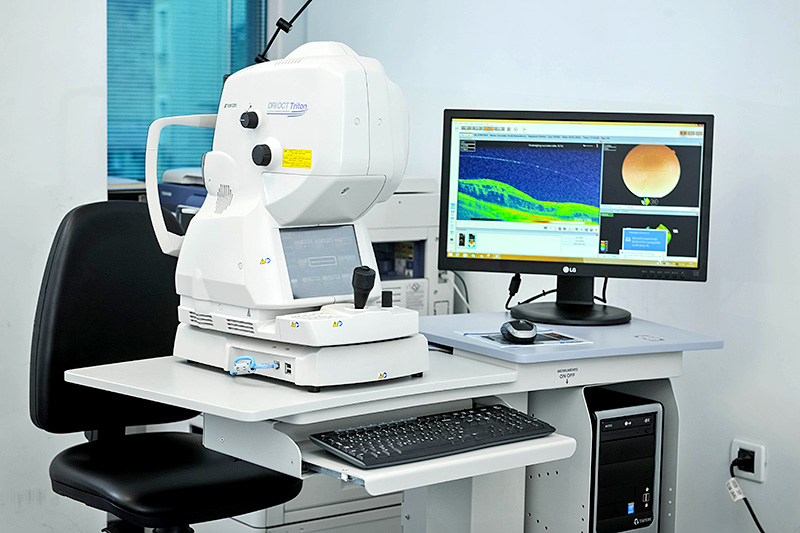Age-related degeneration of the yellow spot or macula
The macula or the yellow spot is a central part of the retina that enables central vision, reading and distinguishing fine details. Macular degeneration is a disease that usually occurs in older adults, usually over 50 years of age, and which results in the loss of vision in the center of the field of vision so that it hinders and prevents reading and facial recognition, although the remaining peripheral vision allows other daily activities. The risk factors, other than age, are family history, smoking and high blood pressure and high triglycerides. It occurs in two forms: "dry" and "wet".

What is dry, and what is wet macular degeneration?
The dry form of macular degeneration is reflected in the changes whereby there is a deterioration of cells in the retina responsible for vision. The dry form progresses more slowly than the wet form of macular degeneration, but also eventually leads to irreversible reduction of visual acuity. The most severe form of dry degeneration leads to a complete thinning of the parts of the retina, which is called geographic atrophy as it resembles a geographical map of areas where the parts of the tissue responsible for vision are missing. Unfortunately, currently there is no effective treatment for dry macular degeneration, but it is extremely important to take a combination of vitamins and high doses of the antioxidant lutein and omega acids that exist in finished dosage forms and provenly slow the progression of dry AMD, as well as its transition into the wet form.
In the wet form of age-related macular degeneration with the deterioration of the macula tissue, there is also bleeding and the accumulation of fluid from abnormal blood vessels under the macula. If the condition is not treated, it leads to scarring over several weeks or months and results in permanent and irreversible damage to the photoreceptors of the yellow spot, after which there is a rapid loss of visual acuity.
What are the symptoms of wet macular degeneration?
The occurrence of the weakening of central vision, difficulty reading, the emergence of a centrally located shadows or loss of the section of the image in the center, distorted lines (e.g. when solving crossword puzzles in the newspaper), a difficulty in distinguishing colors and a slow recovery of vision when moving from a bright room to the dark room are the most common symptoms of wet macular degeneration.
How is wet macular degeneration diagnosed?
An experienced ophthalmologist can identify bleeding and swelling in the macula based on the mere dilation of the pupils and macula examination. A confirmation of the diagnosis is obtained during the same examination on the OCT device. Sometimes an additional confirmation is obtained by performing fluorescein angiography.
What is the treatment for wet macular degeneration?
Although wet degeneration, compared to the dry, causes a rapid loss of vision, there are very effective drugs called anti-VEGF (Endotheilal anti-Vascular Growth Factor) which reduce the bleeding and leakage of fluid under the macula and improve vision. The drugs must be administered by injection into the eye. The injections are given in the eye under local anesthesia and are not painful. After outpatient application, the patient is discharged immediately. The treatment lasts from several months to several years and requires repeated injections at intervals of one month. On the market there are currently Avastin (bevacizumab), Lucentis (ranibizumab) and Eylea (aflibercept), and Fovista (anti-PDGF - Anti Platelet Derived Factor) is at the clinical stage of testing. At the clinic Svjetlost we apply all globally available drugs for treating wet degeneration.
Why are early detection and prevention of this disease important?
For the elderly patients, preventive eye examination is very important, whereby by a simple dilation of the pupil, the condition of the macula can be determined. Initial changes related to wet degeneration can be treated successfully with these injections, but the patient may not notice them immediately.
Why should you choose the clinic Svjetlost?
We have extensive experience in treating these diseases because we started the treatment with injections in 2005, just a few months after the treatment was discovered in the United States. We use all globally available drugs. The treatment with injections is an outpatient treatment and the whole procedure takes about 15 minutes. The treatment is planned individually because our state of the art OCT device enables the detection of the most subtle changes. We are currently participating in the implementation of an American study for testing Fovista, a new smart drug for wet macular degeneration, and are certified by the US regulatory authorities confirming that we meet the highest level of diagnostic and technological standard for the testing of new drugs for retinal diseases.

